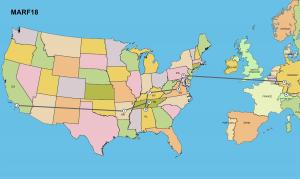Researchers find four unrelated families share identical mutation of BAP1 gene
University of Hawaiʻi at Mānoa
University of Hawai‘i Cancer Center researchers have discovered members of four families, apparently unrelated and living in different states across the U.S., shared the identical mutation of a gene called BAP1 that causes mesothelioma, melanoma, renal carcinoma and other cancers.
This raised two possibilities for the researchers: these four families were related although they did not know it, or researchers had found a hot spot for BAP1 mutations.
In the findings published in PLOS Genetics, through genetic and genealogical studies by Michele Carbone, MD, PhD, director of the UH Cancer Center's Thoracic Oncology Program, and colleagues, it was demonstrated that the family members were related and that they descended from a couple that immigrated to the U.S. from Germany in the early 1700's.
“For about three years we traveled across the U.S. and the world to find evidence that linked these four families, their ancestors and descendants in a large family tree of about 80,000 people,” said Carbone.
The research team found the European ancestors of the couple that immigrated to the U.S. in the 1700's and some of their descendants who are still living in the original home built in the 1400's in Switzerland. The research team anticipates finding many other family members from the family tree who have inherited the mutation.
“These descendants can be tested for BAP1 mutations, and if they are found to have inherited the mutation they can be followed for cancer prevention and also for early detection. For some of the cancer types this would be life saving,” said Carbone. “Moreover, early detection of mesothelioma, and of other cancers that develop in BAP1 carriers are associated with much better survival.”
The paper may be read at:
http://journals.plos.org/plosgenetics/article?id=10.1371/journal.pgen.1005633/.
The University of Hawai‘i Cancer Center is one of 69 research institutions designated by the National Cancer Institute. Affiliated with the University of Hawai‘i at Manoa, the center is dedicated to eliminating cancer through research, education, and improved patient care. Learn more at www.uhcancercenter.org. Like us on Facebook at www.facebook.com/UHCancerCenter. Follow us on Twitter @UHCancerCenter.
For more information, visit: http://www.uhcancercenter.org/index.php/about-us/news-room/392


